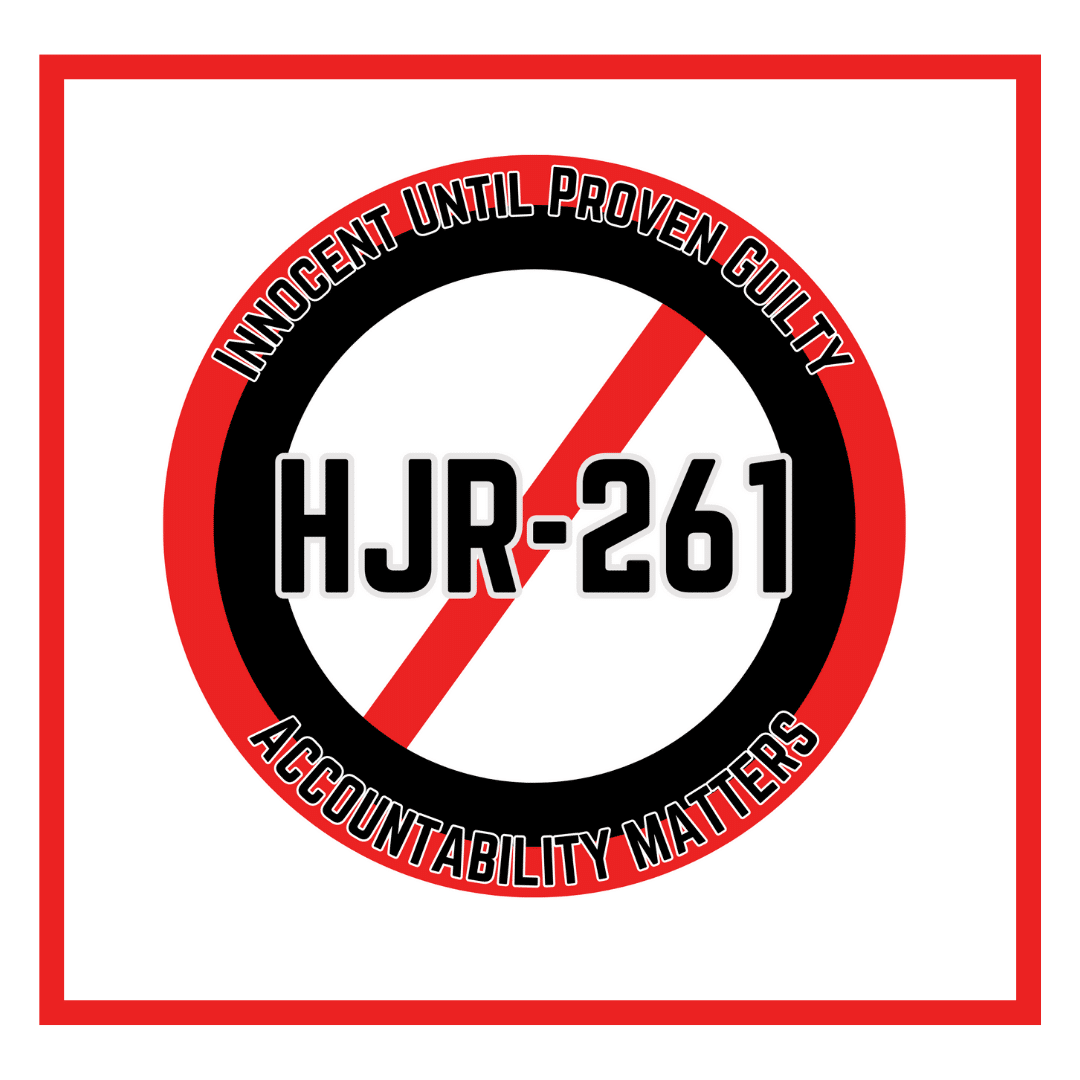Share via:
Before we review HJR 261 resolution eliminates the right to bail under a proposed amendment to the Constitution, let’s understand that changes to our Constitution happen only if it passes each house of the General Assembly with a three-fourths majority of the votes cast, the amendment is then submitted to the voters in the next even-numbered year’s general election.
This radical idea conveys a direct attack on your Constitutional right to bail and the ability to keep the accused accountable to the courts. In simple words, HJR 261 resolution eliminates the right to bail. Let’s learn more about the proposed changes and what this all means for Connecticut residents.
Quick Background on Our Current Constitution
The current Constitution was adopted in 1965 and has been amended 31 times. The Constitution was amended with respect to the rights of the accused and the rights of crime victims in 1996 and was adopted on November 27, after a popular vote of 656,223 in favor and 179,882 against.
The last amendment to the Constitution happened in 2008 allowing pre-registered electors who have not yet attained 18 years of age the right to vote in primary elections.
What Are the Proposed Changes With House Joint Resolution 261 to the Current Constitution?
See below the language of the Current Constitution article Twenty-nine.
CONSTITUTION OF THE STATE OF CONNECTICUT
ARTICLE XXIX. (Article Twenty-nine)
Adopted November 27, 1996.
1.In all Criminal prosecutions, the accused shall have a right to be heard by himself and by counsel; to be informed of the nature and cause of the accusation; to be confronted by the witnesses against him; to have compulsory process to obtain witnesses in his behalf; to be released on bail upon sufficient security, except in capital offenses, where the proof is evident or the presumption great; and in all prosecutions by information, to a speedy, public trial by an impartial jury.
No person shall be compelled to give evidence against himself, nor be deprived of life, liberty or property without due process of law, nor shall excessive bail be required nor excessive fines imposed. No person shall be held to answer for any crime, punishable by death or life imprisonment, unless upon probable cause shown at a hearing in accordance with procedures prescribed by law, except in the armed forces, or in the militia when in actual service in time of war or public danger.
2. In all criminal prosecutions, a victim, as the general assembly may define by law, shall have the following rights:
(1) the right to be treated with fairness and respect throughout the criminal justice process; (2) the right to timely disposition of the case following arrest of the accused, provided no right of the accused is abridged; (3) the right to be reasonably protected from the accused throughout the criminal justice process; (4) the right to notification of court proceedings; (5) the right to attend the trial and all other court proceedings the accused has the right to attend, unless such person is to testify and the court determines that such person’s testimony would be materially affected if such person hears other testimony;
(6) the right to communicate with the prosecution; (7) the right to object to or support any plea agreement entered into by the accused and the prosecution and to make a statement to the court prior to the acceptance by the court of the plea of guilty or nolo contendere by the accused; (8) the right to make a statement to the court at sentencing; (9) the right to restitution which shall be enforceable in the same manner as any other cause of action or as otherwise provided by law; and
(10) the right to information about the arrest, conviction, sentence, imprisonment and release of the accused. The general assembly shall provide by law for the enforcement of this subsection. Nothing in this subsection or in any law enacted pursuant to this subsection shall be construed as creating a basis for vacating a conviction or ground for appellate relief in any criminal case.
Proposed HJR 261 Resolution Eliminates the Right to Bail
RESOLUTION PROPOSING AN AMENDMENT TO THE STATE CONSTITUTION TO REVISE REQUIREMENTS RELATING TO THE OFFERING OF BAIL OR PRETRIAL RELEASE TO PERSONS ACCUSED OF A CRIME.
HJ261 File No. 549 HJ261 (proposed amendment)
The accused shall be eligible for pretrial release, except the court may deny pretrial release to the accused if the court finds no conditions of pretrial release reasonably assure the appearance of the accused in court when required, or protect the safety of any other person or the community, or prevent the accused from obstructing or attempting to obstruct the criminal justice process. The general assembly may provide by law procedures, terms and conditions applicable to pretrial release and the denial thereof.
OLR Bill Analysis HJ 261
RESOLUTION PROPOSING AN AMENDMENT TO THE STATE CONSTITUTION TO REVISE REQUIREMENTS RELATING TO THE OFFERING OF BAIL OR PRETRIAL RELEASE TO PERSONS ACCUSED OF A CRIME.
SUMMARY
The Connecticut Constitution currently prohibits accused criminal defendants from being denied bail.
This resolution, if passed, would amend the constitution to allow the court to hold arrested people in pretrial detention without bail when it finds that no pretrial release conditions (1) reasonably assure that the accused will appear in court when required, (2) protect the safety of others or the community, or (3) prevent the accused from obstructing or attempting to obstruct the criminal justice process.
The amendment also expressly authorizes the legislature to pass laws governing the procedures, terms, and conditions for granting or denying pretrial release.
As under the federal constitution, the state constitution, unchanged by the amendment, prohibits excessive bail. (see full analysis)
Again, HJR 261 resolution eliminates the right to bail, a Constitutional right stipulated in the Eighth Amendment, in part, it provides constitutional protection against excessive bail.
"In conclusion, HJR 261 resolution eliminates the right to bail. The proposed amendment to the Constitution in Connecticut has only one purpose, to eliminate the right to accountable bail. It allows one judge or prosecutor the right to decide whether the accused gets released with no bail or whether this accused ends up jailed throughout the lengthy trial even though this person has not been found guilty."

Live Updates HJR 261 Eliminates Your Right To Bail - It would allow the Courts to hold arrested people in pretrial detention without bail
Opponents of HJR 261 Included Licensed Bail Agents, Chief State Attorney, Chief Public Defender, American Civil Liberties Union of CT and Others
Connecticut Bail Agents joined efforts to raise questions about the secrecy of this proposal (HJR 261 resolution eliminates the right to bail) and the major concerns it brings to Connecticut residents and the minority population. Voicing their opposition local bondsmen and women, small bail bond businesses, the Chief Public Defender, the Chief State Attorney, and the ACLU of CT testified against this resolution last March 27 during the public hearing.
HJR 261 resolution eliminates the right to bail and it is unconstitutional many explained. Unfortunately, the Judiciary Commission passed the resolution with a vote of 25 to 12, and now awaits the House.
You can find the public hearing and testimony in opposition to HJR 261, in this link.
“Patrick Griffin, Chief States Attorney, Division of Criminal Justice: The Division of Criminal Justice opposes the Resolution, stating it is a radical departure from the current system.”
“Deborah Del Prete Sullivan, Legal Counsel, Office of Chief Public Defender: The Office of Chief Public Defender opposes the Resolution, stating that the Connecticut Sentencing Commission hasn’t rendered a decision or recommendations on a new bail system, and that any new system should be reviewed and agreed upon by those in the criminal justice system.”
“Andrew Bloom, Executive Vice President, 3-D Bail Bonds: They oppose the Resolution. They state that bail and surety bonds are the only forms of pretrial release that monitors and enforces appearance and is held accountable while also giving victims their day in court. They list statistics on failure to appear in relation to cash and surety bail. They state a constitutional amendment to remove bail will have unintended consequences of more
minority people being held at the request of prosecutors and judges.”
“Jeff Clayton, Executive Director, American Bail Coalition: They oppose the Resolution, stating that this will increase mass incarceration and that this is a violation of civil rights.”
“Brian Kowalcyzyk, Owner, CT Firearms Training Academy LLC: They oppose the Resolution. They state that if this passes, Connecticut will be a public safety nightmare like New York, New Jersey, and Chicago. They state that this change wouldn’t be fair to the constituents for having to fund the change. They state that this would take a tool away from judges.”
“Daniel Toner, Past Vice President, 3-D Bail Bonds: They oppose the Resolution. They state this is premature and doesn’t reflect the findings from collective studies on pretrial release.”
“Jess Zaccagnino, Policy Counsel, American Civil Liberties Union of CT: They oppose the Resolution. They state that increasing incarceration won’t lower crime rates and that this Resolution would make it harder for people of color to get pretrial release. House Bill 5824 and House Joint Resolution 261 would make it more difficult for people to bail out of jail as they await trial, which does not address the root causes of violence.”
The Right to Bail Is Not the Only Crime-Related legislation Headed to the Connecticut House of Representatives
Lawmakers in the Connecticut Senate approved a bill on Tuesday that would broaden parole eligibility to include certain people serving long sentences for crimes they committed before turning 21 years old.
The legislation, Senate Bill 952, passed on a 23-13 vote along party lines, with Democrats in the majority, after it was amended to lower the proposed age from 25.
Last week, lawmakers greenlighted two additional criminal justice bills: Senate Bill 1194 and Senate Bill 1195.
S.B. 1194 would end sex offense registration requirements for people convicted of a sex crime prior to the expansion of the registry, while S.B. 1195 would prohibit law enforcement officers from stopping a motor vehicle for a secondary traffic violation.
All three bills await another vote in the House of Representatives as of May 19, 2023, including the proposed House Joint Resolution (HJR 261 resolution eliminates the right to bail).
Resources:
https://fastdemocracy.com/bill-search/ct/2023/bills/CTB00027412/#overview
https://www.cga.ct.gov/2023/TOB/H/PDF/2023HJ-00261-R02-HB.PDF
https://en.wikipedia.org/wiki/Constitution_of_Connecticut
https://www.cga.ct.gov/asp/content/constitutions/ctconstitution.htm
https://www.law.cornell.edu/wex/excessive_bail





